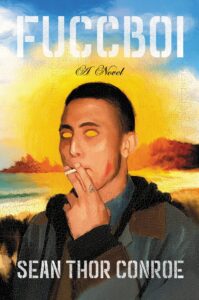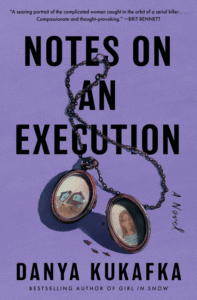
Our silo of superb reviews this week includes Hanson O’Haver on Sean Thor Conroe’s Fuccboi, Katie Kitamura on Danya Kukafka’s Notes on an Execution, John Phipps on Edmund White’s A Previous Life, Colm Tóibín on The Letters of John McGahern, and Tayari Jones on Imani Perry’s South to America.

“The book functions as a kind of younger millennial Künstlerroman, A Portrait of the Artist as a Young Stan. Besides the titular fuccboi, Conroe feels like another detested strawman brought to life: the lit bro … Conroe is 30, but Fuccboi sometimes feels as if a Gen Xer wrote a book for the platonic millennial targeted by those pastel-hued subway ads … The problem lies not in what might be termed either code switching or cultural appropriation, but in the book’s rampant use of the same worn-out text speak as a Verizon commercial … [Giancarlo] DiTrapano’s endorsement goes some way to explaining the hype around Fuccboi, and the novel might have better fit in among the internet-inflected novels released by Tyrant. But the novel is now being marketed as something far broader in scope, a survey of the way we live now … As of now, most of the of-the-moment millennial novels have been written by women. Publishers and critics both seem to want Fuccboi to be the straight millennial male swing at things. It’s not … by failing to mine the heavy stuff to the same depth as the ordinary, Fuccboi becomes the opposite of its title: a lingering relationship short in stimulation.”
–Hanson O’Haver on Sean Thor Conroe’s Fuccboi (Gawker)

“Kukafka aims to undo some of these conventions, including the preoccupation with dead women, in order to explore more ambiguous and ambitious terrain. This novel is defiantly populated with living women; it ruminates on trauma, the criminal justice system and guilt. The narrative tension that animates Girl in Snow is again present, but this time it has a different source. There is no question of who did what, or even why. Instead, it is the inevitability of Ansel’s execution and the moral abyss of capital punishment that floods the novel with dread … In this way, the novel pushes the reader to think about both the uses and the limitations of empathy in fiction. The reader never fully identifies with Ansel, but that seems precisely the point: We don’t need to identify with him in order to understand that his execution is a horror and an outrage … is in part, and often powerfully, a novel about these women. But it is also true that Ansel remains at the heart of the novel, functioning as the story’s conceptual negative space … And as much as the novel may wish to dismantle the mythos of the serial killer, in many ways, the Ansel who emerges—particularly in the sections centered on the various women—reinforces it … nuanced, ambitious and compelling. Perversely, some of the novel’s propulsive power comes from the very conventions it fails to abandon. The seduction of the serial killer narrative is difficult to shake, for reader and author alike. We keep watching, and we keep turning the pages. In our fascination, we’re all implicated.”
–Katie Kitamura on Danya Kukafka’s Notes on an Execution (The New York Times Book Review)
“White’s new novel is one of those outright catastrophes you can hardly believe made it off the editor’s desk. At once artless and affected, it rambles with mind-boggling carelessness between metafictional conceits and contradictory time-schemes before petering out altogether … ends up like a circle jerk with one man in it … Unfortunately, White makes little attempt to differentiate the two voices, which speak in paragraphs as aimlessly picaresque as the novel itself … The back and forth is overwhelmed by the fustian Ruggero, with featureless Constance increasingly crowded out. What we do find out about Constance feels ham-fistedly contrived to provoke a younger (and better) generation of writers … the dialogue is bad, the erotic writing is joyless, and the book is riddled with grammatical errors … Elsewhere we find blunt inconsistencies … Throughout this novel the author fails to do the basics. He can’t sustain a time scheme or a conceit, forgets his place, contradicts himself and changes tense for no reason. He seems to have lost all relish for language. He reserves his powers of observation and imaginative sympathy for himself. A Previous Life is a mess, and it badly needed an editor, but what it needed most of all was a writer.”
–John Phipps on Edmund White’s A Previous Life (The Times)
“Despite the autobiographical elements in his fiction, McGahern wasn’t especially interested in exploring his own psyche. He rowed in familiar waters because the cadences in the prose and the resonant images came more naturally to him. And it was cadence and image that energised him, not self-revelation. In a letter from 1960, before he had published anything, he wrote: ‘The common notion that you can make art out of your life, refinement of pleasure etc, is pure moonshine as far as I see it. There must be some morality. You might as well call the philanderer a lover’ … At the time The Pornographer came out, I had little interest in McGahern’s work. I found too much Irish misery in it, too much fear and violence and repressed sexuality, too much rural life and Catholicism. Perhaps my aversion was made more intense by the fact that I recognised this world. I had been brought up in it; I was still living in it … McGahern’s world was self-enclosed. From unpromising material, and in a tone that seemed simple and spare, he could evoke a scene or an undramatic moment with astonishing precision. After The Pornographer, I began to re-assess his earlier work, and grew to love The Barracks, with special reverence for the battle between light and darkness in a small domestic setting at the very start of the book … I remember the expression on his face even better than his voice, the look of immense sadness at the thought that he would soon die and that there was nothing that could be done about it, and then a smile, almost triumphant, and then a look of pure satisfaction that something true had finally been said. He had found the right words for it. And then he changed the subject.”
–Colm Tóibín on The Letters of John McGahern (London Review of Books)
“Any attempt to classify this ambitious work, which straddles genre, kicks down the fourth wall, dances with poetry, engages with literary criticism and flits from journalism to memoir to academic writing—well, that’s a fool’s errand and only undermines this insightful, ambitious and moving project. This is no ‘both sides’ affair: Perry is an unabashed ‘movement’ baby, raised by intellectual freedom-fighter parents. The conviction of this book is that race and racism are fundamental values of the South … Perry vowed to visit and contemplate as much of the South as possible for this project; this ambition is both gift and obstacle. The benefit of such a large canvas is that patterns are easily identified. Historical injustice such as the Wilmington Massacre cannot be dismissed as a one-off, nor can the contemporary violence of Dylann Roof, or the storied resistance of Rosa Parks. Perry finds that one ‘hidden virtue of an unsure genealogy is a vast archive of ways of being learned from birth’ … it must be said that this work, though sometimes uneven, is an essential meditation on the South, its relationship to American culture—even Americanness itself. This is, as Perry puts it, ‘not a preservation. This is intervention.’ For too long, the South has been scapegoated and reduced to a backward land on the other side of some translucent, but impenetrable, barrier.”
–Tayari Jones on Imani Perry’s South to America: A Journey Below the Mason-Dixon to Understand the Soul of a Nation (The New York Times Book Review)

